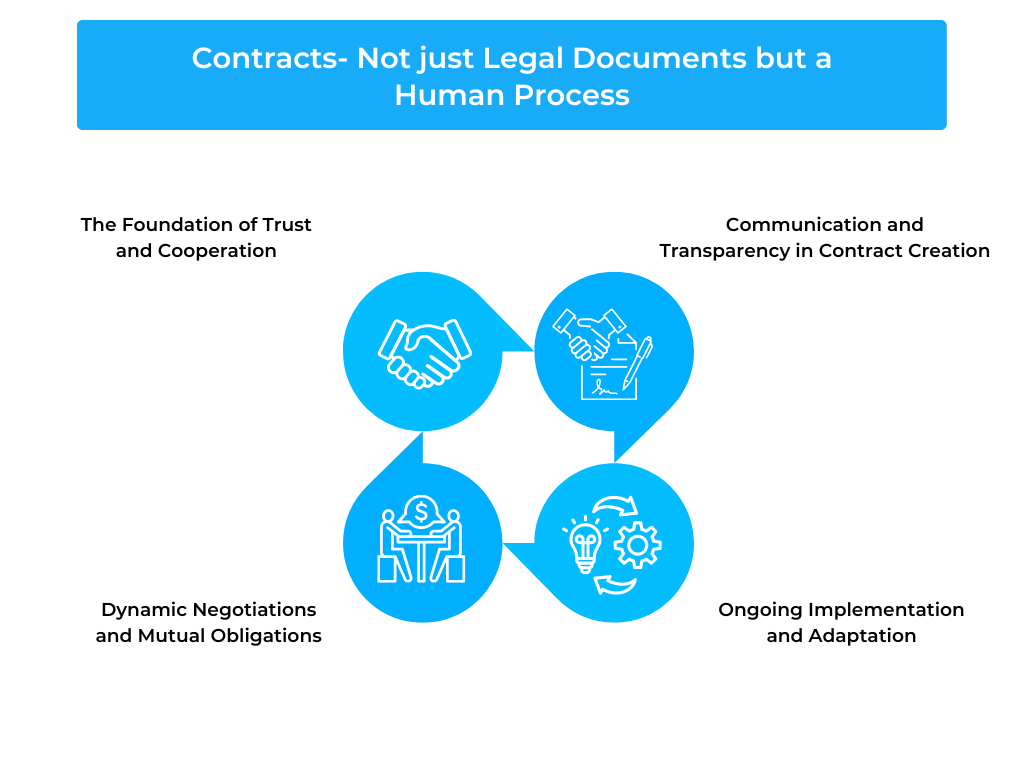Contracts – Not just Legal Documents but a Human Process

Contracts, often seen as dense legal documents filled with jargon, hold a deeper significance beyond their formalities. They are not just bureaucratic instruments but a human process that builds trust and cooperation. Contracts provide the framework for agreements, enabling parties to navigate complex relationships with confidence.
While legal language is necessary for clarity and enforceability, it is essential to acknowledge the human aspect underlying contracts. They embody negotiations, understanding, and mutual obligations, reflecting the intentions, expectations, and commitments shared by the parties involved.
In this article, we will explore how contracts go beyond being mere legal documents and serve as a foundation for collaboration and ethical standards.

The Foundation of Trust and Cooperation
Contracts serve as the bedrock upon which trust and cooperation are built. When parties enter into a contractual agreement, they embark on a journey of collaboration towards a common goal. This journey involves open negotiations, compromise, and a shared understanding of each party’s rights and responsibilities.
By drafting and reviewing contracts, parties engage in a process that fosters communication and transparency. This human interaction is essential in establishing trust and ensuring a solid foundation for future collaboration. Contracts go beyond being mere legal documents; they represent a commitment between parties to work together in good faith, laying the groundwork for mutual trust and cooperation.
Dynamic Negotiations and Mutual Obligations
Contracts are not static documents, but rather the product of dynamic negotiations and the establishment of mutual obligations. The process of creating a contract involves extensive discussions and negotiations between the involved parties. Through these interactions, parties work to align their interests, address concerns, and reach a consensus on the terms and conditions of the agreement.
This dynamic aspect of contract formation ensures that each party’s needs and interests are taken into account, promoting fairness and equity. Once the contract is finalized, it becomes a binding agreement that outlines the mutual obligations and responsibilities of the parties involved. These obligations are not one-sided, but rather a reflection of the commitments made by all parties. By delineating these obligations, contracts provide a clear framework for cooperation and accountability.
Mutual obligations create a sense of trust and reliance on each other’s performance. Each party understands that their actions and compliance with the terms of the contract impact the overall success of the collaboration. This shared responsibility fosters a cooperative mindset, encouraging parties to work together towards the achievement of their shared goals.
Communication and Transparency in Contract Creation
Effective communication and transparency are crucial elements in the creation of contracts. During the contract drafting process, open and clear communication between parties is essential to ensure a thorough understanding of each other’s expectations, rights, and obligations.
By engaging in open dialogue, parties can express their needs, concerns, and preferences. This allows for a comprehensive exploration of various aspects of the agreement, such as pricing, deliverables, timelines, and dispute resolution mechanisms. Through effective communication, potential misunderstandings can be minimized, and parties can work together to find mutually acceptable solutions.
Ongoing Implementation and Adaptation
Contracts necessitate ongoing implementation and adaptation to remain relevant. Parties must fulfill their obligations while being prepared to adjust terms as circumstances change. Implementation involves diligent adherence to agreed-upon responsibilities, building trust among parties.
However, unforeseen events or evolving needs may require contract modifications. Open communication is crucial for negotiating amendments that accommodate new realities. Adapting contracts ensures their continued effectiveness, addressing disputes and fostering a cooperative environment. By embracing flexibility and proactively addressing changes, parties can maintain a productive and collaborative relationship that aligns with the evolving needs of the agreement.
Beyond Legalities: The Human Element in Contracts
Contracts extend beyond their legal framework, encompassing a significant human element. They represent more than just a set of enforceable obligations; they embody the intentions, expectations, and commitments shared by the parties involved. Contracts foster collaboration, trust, and communication through dynamic negotiations and mutual understanding. Transparent communication during contract creation ensures a comprehensive alignment of interests.
Ongoing implementation and adaptation allow parties to address changing circumstances and maintain a constructive working relationship. By recognizing and embracing the human aspect of contracts, we can unlock their true potential as tools for fostering cooperation and achieving shared goals.
Conclusion
In conclusion, contracts are far more than mere legal documents. They are a reflection of the human process that underlies our interactions and collaborations. By acknowledging and embracing the human element in contracts, we can harness their power to facilitate meaningful relationships and achieve successful outcomes. Ultimately, contracts are not just about legalities; they are a testament to the essential role of human interaction in shaping our agreements and fostering a harmonious society.
Try our Debt Resolution solutions today Request a Demo